Aloe Vera or Aloe barbadensis is a plant with a short stem that stores water in its leaves. It is also known as ‘Ghritkumari’ in Hindi. The leaves are greenish in colour with spiky edges. Aloe vera is excellent for our health. The gel present in the leaves can be consumed by making juice out of them. Aloe vera contains vitamin C, vitamin E, vitamin B9 and vitamin B12. It also contains minerals like calcium, copper, sodium, magnesium, potassium, selenium, manganese, zinc, etc.
Aloe has very potent anti ageing effects when applied topically. It stimulates fibroblasts that produce collagen and elastin, making the skin more elastic and less wrinkled. It also has cohesive effects on the superficial flaking epidermal cells by sticking them together, which softens the skin. The amino acids also soften hardened skin cells and zinc acts as an astringent to tighten pores.
Dr. M.G. Kartheeka, MBBS, MD(Pediatrics)
Use of topical and oral aloe vera gel should be done with caution as it may cause skin irritation, hives, cramping and other severe conditions which might require medical intervention.
Dr. Ashish Bajaj, M.B.B.S., M.D. in Clinical Pharmacology and Toxicology
How to Use Aloe Vera on Hair:
Also Read: Triphala: Uses, Benefits, Side Effects & More!
Also Read: 9 Aloe Vera Benefits for Face and Skin!
Aloe vera is a low-maintenance plant that’s easy to grow at home. The gel extracted from its stems can be used internally and externally for better health. However, if you are suffering from health complications, it is recommended that you consult with your physician before using this natural ingredient.
Also Read: 15 Amazing Health Benefits of Turmeric Milk!
Yes, aloe vera is beneficial for oily skin as it helps control excess oil production, soothes inflammation, and provides hydration without clogging pores, promoting a balanced and healthier complexion.
Yes, aloe vera is effective for pimples due to its anti-inflammatory and antibacterial properties. Applying aloe vera gel on pimples helps soothe irritation, reduce redness, and accelerate the healing process.
Absolutely, aloe vera is beneficial for dandruff as it possesses antimicrobial properties that can help alleviate scalp irritation and flakiness. Applying aloe vera gel to the scalp can soothe and moisturise, promoting a healthier environment for the hair.
Yes, aloe vera gel can function as a moisturiser. Its lightweight texture and high water content make it an effective natural moisturiser that hydrates the skin without leaving a greasy feel, making it suitable for various skin types.
Begin by slicing a mature aloe vera leaf and extracting the gel. For facial use, apply a small amount of the gel to cleansed skin, gently massaging it in circular motions. Allow it to sit for 15-20 minutes before rinsing off, leaving your skin refreshed and moisturised.
While some people may use aloe vera as a natural lubricant, it’s essential to choose aloe vera gel that is specifically formulated for topical use and free from additives. However, it’s crucial to be cautious, as aloe vera may not be compatible with all types of intimate activities and may not provide long-lasting lubrication compared to purpose-made products.
There is no evidence to suggest that aloe vera causes hair loss. In fact, aloe vera is often used to promote hair health, as it contains enzymes and nutrients that can nourish the scalp and strengthen hair strands.
Yes, aloe vera is known for its skin-soothing properties and may help reduce tan. Applying aloe vera gel on the affected areas can moisturise the skin, promote healing, and gradually fade tan, leaving the skin refreshed.
No, it’s not safe for dogs to consume aloe vera. Aloe vera contains compounds that may be toxic to dogs and can cause gastrointestinal issues. It’s advisable to keep aloe vera products away from pets and consult a veterinarian if ingestion occurs.
Aloe vera may help fade dark spots due to its skin-healing properties. Regular application of aloe vera gel can promote cell turnover, reduce pigmentation, and contribute to a more even skin tone over time.
While aloe vera gel can improve the health of the scalp by reducing inflammation and providing essential nutrients, scientific evidence on its direct impact on hair growth is limited. However, it may contribute to overall hair health and condition, promoting a favourable environment for hair growth.
Aloe vera is renowned for its versatile benefits. It is commonly used to soothe sunburn, moisturise the skin, promote wound healing, reduce inflammation, and can be applied to hair for hydration. Additionally, aloe vera is recognised for its potential in easing digestive issues when consumed.
Yes, aloe vera gel has a shelf life and can expire. It is essential to check the product’s expiration date and store it according to the recommended conditions to ensure its effectiveness and safety for use on the skin.
The recommended daily intake of aloe vera juice varies, but generally, it’s advised to start with a small amount, around 1-2 ounces per day, and gradually increase as tolerated. However, it’s crucial to consult with a healthcare professional to determine the appropriate dosage for individual health needs.
Yes, aloe vera can be toxic to cats if ingested. It contains compounds that may cause gastrointestinal upset, including vomiting and diarrhoea. It’s important to keep aloe vera and products containing it out of reach of cats and seek veterinary attention if ingestion occurs.
To make aloe vera juice, extract the gel from a mature leaf, blend it with water in a 1:3 ratio, and optionally add a touch of citrus juice for flavour. Strain the mixture to remove pulp, refrigerate, and enjoy this hydrating and nutritious drink.
To consume aloe vera, start by peeling the outer skin to reveal the gel. Rinse the gel to remove aloin, the bitter substance, and dice it into small, manageable pieces. Incorporate the gel into smoothies or salads for a nutritious boost, ensuring moderation due to its potential laxative effects.
While aloe vera gel is edible and contains beneficial nutrients, it’s crucial to consume it in moderation due to its potential laxative effects. Peel the outer skin, extract the gel, and incorporate it into smoothies or salads for a nutritious boost.
Aloe vera juice offers potential health benefits, including hydration, digestive aid, and a source of vitamins and antioxidants. However, it’s essential to consume it in moderation and consult with a healthcare professional, as excessive intake may lead to adverse effects.
No, aloe vera gel is not a traditional toner. While it has soothing properties and can hydrate the skin, it lacks the astringent qualities typically found in toners, which are designed to balance the skin’s pH and tighten pores.
Yes, aloe vera gel can be beneficial for lips as it helps moisturise and soothe dry or chapped lips, providing relief and promoting overall lip health.
While aloe vera gel has hydrating properties that may reduce puffiness, it is not specifically proven to effectively remove dark circles. Other remedies and lifestyle changes, such as adequate sleep and a balanced diet, may be more effective in addressing dark circles.
No, aloe vera is generally not known to darken the skin. In fact, it is often used to soothe and lighten the skin, providing relief from issues such as sunburns or hyperpigmentation.
Disclaimer: The information provided here is for educational/awareness purposes only and is not intended to be a substitute for medical treatment by a healthcare professional and should not be relied upon to diagnose or treat any medical condition. The reader should consult a registered medical practitioner to determine the appropriateness of the information and before consuming any medication. PharmEasy does not provide any guarantee or warranty (express or implied) regarding the accuracy, adequacy, completeness, legality, reliability or usefulness of the information; and disclaims any liability arising thereof.
Aloe Vera, the modest houseplant, is believed to be a wonder herb, being used for its medicinal properties since ages. This plant is found to be rich in nutrients that help improve digestion and even boost immunity. Aloe Vera application in gel form can also be used to enhance skin and hair health. In this blog, we’ll discuss how this aloe vera gel can help you achieve a young, radiant skin and smooth, shiny hair.
Before we get into the essential reasons and health benefits of Aloe Vera, let us first learn how to make Aloe Vera gel directly from the plant. If you have an Aloe Vera plant at home, select its thicker leaves or stems and cut it from the base. You may also pull its leaves from their bottom. Be careful as the plant has thorns1.
Next, use a sharp knife to slice the thorns from the edge of each leaf. Then slice the aloe vera stalk in half while keeping the gel side upwards. You may slice open leaves as well. Use a spoon to scrape the gel into a container. When all the gel is scraped out, refrigerate the container and store the gel.
A lot of ready to use aloe vera gels are also available in the market. So, if this process seems too tedious for you, you can just buy one as well.
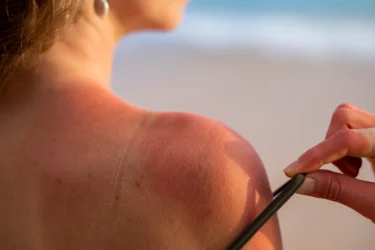
Aloe Vera gel has anti-inflammatory properties and is cooling in nature. It can be one of the best natural remedies for burnt skin like in case of a sunburn2. Applying this gel helps form a protective layer on the skin, and it also helps to retain moisture. It is rich in antioxidants as well as minerals that can help boost the healing. So, now you can enhance summer skin health using aloe vera.
Aloe vera contains the enzyme bradykinase, which is the active ingredient to suppress signs of inflammation, namely redness, swelling, pain, and heat when the gel is applied on the skin5.
Dr. Siddharth Gupta, B.A.M.S, M.D (Ayu)
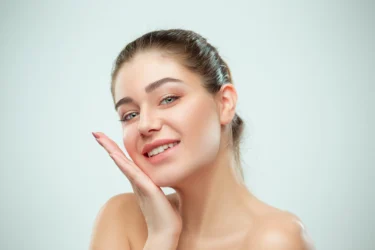
Unlike regular moisturizers that are available in the market, Aloe Vera gel, when used as a moisturizing gel, doesn’t leave a greasy film on the face and the skin. In fact, it does just the opposite by unclogging the pores and softening the skin.
It can be used as an aftershave treatment. This is because Aloe Vera gel helps to keep the skin hydrated and due to its anti-inflammatory nature, helps in healing small nicks & cuts like those occurring with razor use. It also helps deal with a dry skin3.
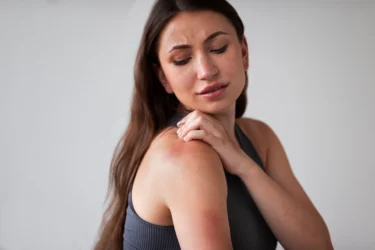
Aloe Vera is known to be beneficial for burns, cuts, and other minor injuries. This is because Aloe Vera boosts healing of wounds, and reduces the time of healing. It’s a great skin burn treatment, especially for the smaller and superficial ones. Aloe Vera is said to penetrate the epidermis, i.e., the outer layer of the skin faster than water and speed up skin cell formation, promoting repair4. However in case of major burns or injury, please consult a doctor and follow medical advice. Natural remedies like Aloe Vera should only be used as adjunct in such cases.
There has been a recent advancement regarding the composition of aloe vera. Researchers have isolated a compound, alprogen from aloe vera which is found to be effective against skin allergy5.
Dr. Rajeev Singh, BAMS

Aloe Vera gel has vitamin C and E, and beta-carotene in abundance. These are antioxidants that help fight oxidative stress in the body, leading to its proposed anti-ageing effects. It also has antimicrobial properties and is anti-inflammatory, and helps to increase the production of collagen in the body and improve skin elasticity5. It may therefore help eradicate skin blemishes and diminish age lines, although results can depend on several other factors.
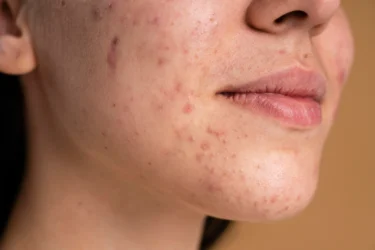
Aloe Vera can be suitable for even those who have acne prone skin. It helps in gentle cleansing, and its antimicrobial properties can help reduce pimples without causing any damage to the skin. Aloe Vera contains polysaccharides and gibberellins. These may help in the growth of new cells and at the same time, reduce inflammation and redness. It may also work as an astringent to reduces the size of pores, flushing out the excess sebum, microbes, and dirt6.
A Highly effective and prominent compound which works against inflammation of the skin has been recently extracted5.
Dr. Ashok Pal, B.A.M.S.
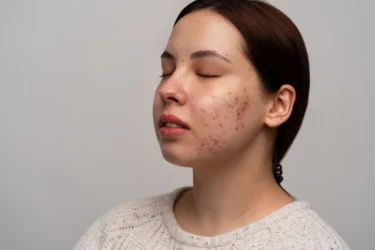
As already discussed, Aloe Vera can help speed up skin cell reproduction and reduce redness by fighting skin inflammation. Plus, its active agent aloin has skin depigmenting properties. So, it may be used as a natural way to manage stretch and acne marks, reduce freckles and lighten age spots7. Adding some lemon juice to the gel mixture can make it one of the perfect home remedies for glowing skin.
Aloe vera gel is considered a great cleanser for the skin due to its antiseptic action. It is comprised of soap-like substances, saponins, which are effective antiseptic agents5.
Dr. Smita Barode, B.A.M.S, M.S.

Like skin reproduction, Aloe Vera gel may help in activating new hair growth by increasing the blood circulation to the scalp. It also provides essential minerals and vitamins. However, when it comes to hair growth, results may vary as individual factors do play a role. Aloe Vera contains proteolytic enzymes that can help repair dead skin on the scalp. So aloe vera works as a great remedy for scalp problems in women and men8.
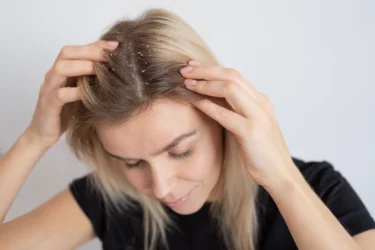
Aloe Vera helps in healing dry scalp, fungal infections, and an excessively oily scalp. All these are significant causes of dandruff. Aloe vera is one of the very useful natural ways to get rid of dandruff9. Although a flaky scalp can be due to several reasons, ranging from scalp infections to inflammatory conditions like psoriasis. It’s best to discuss with a dermatologist before resorting to natural remedies for any major scalp issues.
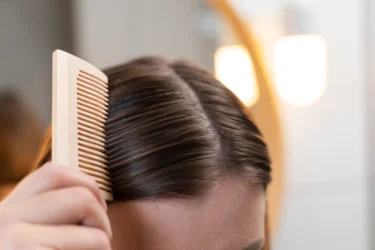
Just as it helps in moisturizing the skin, Aloe Vera also helps to condition the hair and soften it. Regularly applying Aloe gel to the hair and scalp helps to maintain the vitality of the hair and gives a smooth shiny appearance1,10.
Although initial studies have shown benefits of aloe vera for skin and hair, further large-scale clinical trials are needed to confirm these. Also, remember its best to consult a dermatologist before considering any home remedies for your skin or scalp-related issues.
Did you know that there are almost 250 different aloe vera varieties, out of which only 4 are capable of beneficial effects on health? Also, aloe vera is 96% water. The health benefits are due to the constituents which constitute about 4% of the composition of aloe vera11.
Dr. Anuja Bodhare, B.A.M.S, M.D (Ayu)
Here are a few simple and easy Aloe vera DIY recipes for using on your skin:
Also Read: Effective Uses & Benefits of Aloe Vera!
Aloe vera can have a wide range of possible medical applications, including several advantages for skin and hair health. It can help hydrate the skin, heal minor burns and injuries and also help lighten pigmented areas. It may also help deal with scalp issues and make your hair smooth and shiny. However, remember that it must be used carefully. Inappropriate use of aloe vera, such as ingesting it orally, might have negative health implications. Consult your doctor to understand and manage the underlying cause for your problem first and follow their advice on safe and appropriate use of home remedies like aloe vera alongside.
Also Read: 20 Foods To Eat For A Healthy Skin!
There may be a few side effects of aloe vera that can occur in some individuals. If you take aloe vera orally, it might cause cramping and diarrhoea as it has a laxative effect. High doses of oral aloe are dangerous, and you can also have intestinal problems, heart issues, haemorrhoids, kidney problems, diabetes or electrolyte imbalances with excessive consumption.
Aloe vera used in creams and gels vary in dosage. While some may have just 0.5% aloe vera, others may contain as much as 70% aloe vera. Aloe as an oral supplement must be consumed in moderation and it is best to consult a doctor before using the same.
Aloe vera is often used as a natural remedy for minimising the appearance of dark circles. It may improve skin texture by moisturising and reducing inflammation and can be used under the eye for dark circles, but not too close to the edge of your eyelid.
Disclaimer: The information provided here is for educational/awareness purposes only and is not intended to be a substitute for medical treatment by a healthcare professional and should not be relied upon to diagnose or treat any medical condition. The reader should consult a registered medical practitioner to determine the appropriateness of the information and before consuming any medication. PharmEasy does not provide any guarantee or warranty (express or implied) regarding the accuracy, adequacy, completeness, legality, reliability or usefulness of the information; and disclaims any liability arising thereof.